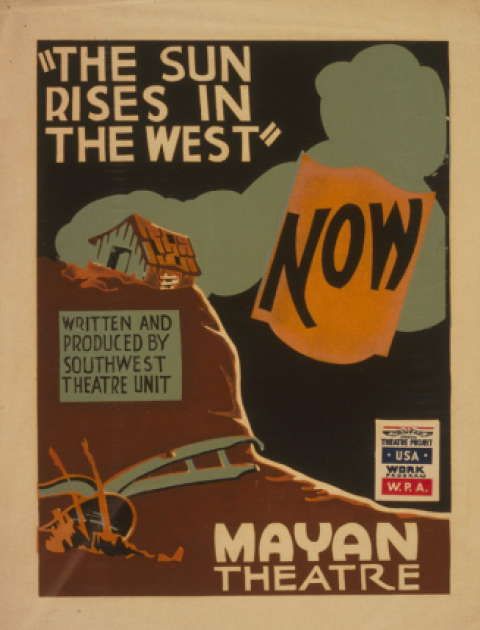- The Sun Goes Down in the West - Amy Brady (The Awl)
- How Barack Obama Destroyed the Republican Party - Martin Longman (Washington Monthly)
- Republic of Fear - Jeet Heer (New Republic)
- 5 Political Myths Trump Is Exploding - Emily Thorson (Politico)
- Native American Groups Defend Their Right to Vote - Cecily Hilleary (Voice of America)
- Marie Kondo and the Privilege of Clutter - Arielle Bernstein (The Atlantic)
By Amy Brady
March 15, 2016
The Awl
In 1951, a full fifteen years after her The Sun Rises in the West became a huge hit for the Los Angeles Federal Theatre Project, Mary Virginia Farmer was called before the House UnAmerican Activities Committee to testify whether she had ever participated in anything “subversive,” the committee’s code word for Communism. The committee questioned eighteen witnesses the day they called on Farmer. Four of them, including Farmer, went into the record as “unfriendly” for refusing to answer their questions. She never worked in Hollywood again.
Farmer’s story isn’t told in Trumbo, the recent film starring Bryan Cranston that chronicled the resistance of the Hollywood Ten, a group of men working in the film industry as screenwriters and directors who were blacklisted and jailed for their refusal to cooperate with HUAC. It isn’t told anywhere; Farmer’s work as an artist and political agitator has been relegated to literal footnotes in academic treatments of the history of American political theatre and Hollywood’s blacklist, if mentioned at all. But her work is worth remembering.
How Barack Obama Destroyed the Republican Party
By Martin Longman
March 31, 2016
Washington Monthly
The Republicans thought they’d get more short-term bang for the buck by encouraging the Tea Party and the Birthers (including Trump). And they did.
And now their long-term reward is “Barack Obama will retire a happy man. He is now close to destroying his political enemies—the Republican Party, the American conservative movement and the public-policy legacy of Ronald Reagan.”
By Jeet Heer
March 31, 2016
New Republic
From the moment he stepped off the Trump Tower escalator last June, and in his campaign announcement speech called Mexican immigrants criminals and rapists, Donald Trump’s presidential run has been an exercise in white nationalism. The questions that have obsessed political pundits since that moment—Can he win? Will he cause a crack-up in the Republican Party? What happens if there’s a brokered convention and the establishment tries to take the nomination away from him?—are important, of course. But they’re far too narrow. What really needs to be asked is this: How is Donald Trump changing America? Not how he will change the country if he lands in the White House, but how he’s already changing it. Because Trump, even before he secures the Republican nomination—and even if he never wins the presidency—has transformed America as much as any political figure of our era. It’s a transformation that transcends politics and bleeds deeply into our culture.
5 Political Myths Trump Is Exploding
By Emily Thorson
March 28, 2016
Politico
Donald Trump has provided high-profile, living disproof of some of the most familiar myths of American politics.
You’ve heard them too: “Voters have become extreme,” or “This mistake could end his campaign,” or “Obama’s success has shown that race doesn’t matter”—all pieces of warmed-over analysis that political scientists no longer take seriously.
As Trump hacks a new trail through presidential politics, he’s also performing a kind of service by clearing out some of these tropes, hopefully for good.
Native American Groups Defend Their Right to Vote
By Cecily Hilleary
March 15, 2016
Voice of America
When Americans go to the polls this November to elect the next U.S. president, Native American groups worry that many of their members will be turned away from the ballot box.
Native Americans won U.S. citizenship more than 90 years ago. Even so, many states denied them — as they did African Americans — the right to vote, subjecting them to poll taxes, literacy tests, harassment and intimidation.
Marie Kondo and the Privilege of Clutter
By Arielle Bernstein
March 25, 2016
The Atlantic
Since the Japanese “professional organizer” Marie Kondo’s The Life-Changing Magic of Tidying Up was released in 2014, it’s become a New York Times bestseller and sold over 3 million copies. Kondo’s tips on de-cluttering have been featured everywhere from The Today Show to Real Simple to The Guardian, and have inspired the follow-ups Spark Joy, an illustrated guide to tidying things up even more, and Life-Changing Magic, a journal where you can ruminate on the pleasures of owning only your most cherished personal belongings.
At its heart, the KonMari method is a quest for purity. To Kondo, living your life surrounded by unnecessary items is “undisciplined,” while a well-tidied house filled with only the barest essentials is the ultimate sign of personal fulfillment. Kondo’s method involves going through all the things you own to determine whether or not they inspire feelings of joy. If something doesn’t immediately provoke a sense of happiness and contentment, you should get rid of it.


Spread the word